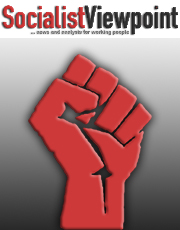Souls on Ice
This message was written for the February 20 “Occupy for Prisoners” protests at prison gates taking place around the country.1
When I heard of the call, just raised in Oakland, California, to “Occupy the Prisons,” I gasped.
It was not an especially radical call, but it was right on time.
For prisons have become a metaphor; the shadow-side, if you will, of America. With oceans of words about freedom, and the reality that the U.S. is the world’s leader of the incarceration industry, its more than time for the focused attention of the Occupy Movement.
It’s past time.
For the U.S. is the world’s largest imprisoner for decades, much wrought by the insidious effects of the so-called “drug war”—what I call, “the War on the Poor.”
And, Occupy, now an international movement, certainly has no shortage of prisons to choose from. Every state, every rural district, every hamlet in America has a prison; a place where the Constitution doesn’t exist, and where slavery is all but legalized.
When law professor, Michelle Alexander, took on the topic, her book, The New Jim Crow, took off like hotcakes—selling over 100,000 copies in just a few months.
And where there are prisons, there is torture; brutal beatings, grave humiliations, perverse censorship—and even murders—all under a legal system that is as blind as that statue which holds aloft a scale, her eyes covered by a frigid fold of cloth.
So, what is Occupy to do?
Initially, it must support movements such as those calling for the freedom of Lakota brother Leonard Peltier; the MOVE veterans of August 8th, 1978; the remaining two members of the Angola 3: Herman Wallace and Albert Woodfox; Sundiata Acoli; Russell “Maroon” Shoatz; and many other brothers and sisters who’ve spent lifetimes in steel and brick hellholes.
But, the Occupy Movement must do more.
As it shifted the discussion and paradigm on economic issues, it must turn the wheel of the so-called “Criminal Justice System” in America, that is in fact, a destructive, counter-productive, annual $69 billion boondoggle of repression; better-known by activists as the Prison-Industrial-Complex.
That means more than a one-day event, no matter how massive or impressive. It means building a mass movement that demands and fights for real change, and eventually abolition of structures that do far more social damage than good.
It means the abolition of solitary confinement, for it is no more than modern-day torture chambers for the poor.
It means the repeal of repressive laws that support such structures.
It means social change—or it means nothing.
So let us begin! Down With the Prison Industrial Complex!
—PrisonRadio.org, February 2, 2012
Write to:
Mumia Abu-Jamal AM-8335
SCI-Mahanoy
301 Morea Road
Frackville, PA 17932


